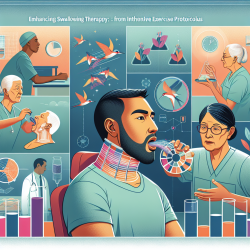Enhancing Swallowing Therapy: Insights from Intensive Exercise Protocols
As a speech-language pathologist committed to evidence-based practice, it is essential to continuously seek out research that can enhance therapeutic outcomes. A recent study titled An intensive swallowing exercise protocol for improving swallowing physiology in older adults with radiographically confirmed dysphagia offers valuable insights into improving swallowing therapy for older adults.
Understanding the Research
The study conducted by Balou et al. (2019) explored the impact of an 8-week intensive swallowing exercise protocol on older adults with dysphagia. The participants, who were otherwise healthy, underwent a series of exercises including effortful swallows, Mendelsohn maneuvers, tongue-hold swallows, supraglottic swallows, Shaker exercises, and effortful pitch glides. The exercises were designed to target the swallowing muscles and improve swallowing physiology.
Key Findings
The results of the study were promising, indicating significant improvements in swallowing physiology. Specifically, improvements were noted in:
- Initiation of the pharyngeal swallow
- Laryngeal elevation
- Reduction in pharyngeal residue
While the study did not find a significant change in swallowing safety, the median Penetration-Aspiration Scale (PAS) score improved from a 3 (unsafe) to a 1 (safe), suggesting a clinically meaningful shift.
Implications for Practice
For practitioners, these findings underscore the potential benefits of incorporating high-intensity swallowing exercises into therapy protocols for older adults with dysphagia. The study highlights the importance of targeting specific physiological components of swallowing to achieve better outcomes.
While this research provides a strong foundation, it also points to the need for further studies to isolate the effects of individual exercises and determine the optimal dosage and frequency. As clinicians, staying informed about such research can guide us in refining our therapeutic approaches and improving patient outcomes.
Encouraging Further Research
The study by Balou et al. (2019) is a step forward in understanding the rehabilitative potential of swallowing exercises. However, the authors acknowledge the need for additional research to explore the effectiveness of individual exercises and their impact on different etiological groups.
As practitioners, we should advocate for and participate in research that seeks to fill these gaps. By doing so, we contribute to the advancement of our field and ensure that our interventions are grounded in robust evidence.
To read the original research paper, please follow this link: An intensive swallowing exercise protocol for improving swallowing physiology in older adults with radiographically confirmed dysphagia.










